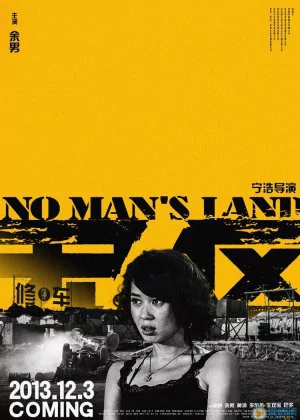No Man's Land
Director Hao Ning has been around for a while, but it wasn't until I watched Guns 'n Roses that he crossed my path. No Man's Land [Wu Ren Qu / Western Sunrise] is his latest and I'm glad to say Ning made some important strides forward. Rather than attempting to follow in the footsteps of his fellow countrymen, it seems he's actively trying to find his own way. The result? A dark, often funny and twisted thriller that stands well on its own.

China has a desert. While that isn't exactly a secret (it's a pretty big one too), for some weird reason I keep forgetting about it. It has probably to do with the fact that China itself doesn't think it a very good place to shoot films, but whenever I see a Chinese film set in the Gobi, it strikes me as a little weird, even a bit awkward. Ning takes it one step further by adding some slight Western influences, then again that's just one of the many nods that are given in this film.
Pan Xiao is a young and upcoming lawyer who is sent to a backwater town to defend a local falcon poacher. He manages to clear the man's case and heads back to Hong Kong. But not without hustling the poacher out of his ex-wife's car. In his newly acquired vehicle the lawyer sets out for a trip through the desert, but the poacher is aching for revenge and sends his henchman after Xaio.
The first half of No Man's Land reminded me a lot of Oliver Stone's U Turn. A young, dapper-looking guy enters a desert, meets up with a bunch of local weirdos and gets beaten up every turn he takes. Pan Xiao's transformation between the beginning and ending of the film is pretty drastic, but where U Turn is a fully fledged dark comedy, the atmosphere in No Man's Land becomes a bit grimmer halfway through, morphing itself into a bona fide thriller.

Visually Ning delivers a stunning looking film. The work of cinematographer Jie Du should not be underestimated. Sharp contrast, a dirty sepia filter and superb camera angles combine into a visually lush film. But the setting and props look just as amazing. The trucks, the costumes and the shacks are all incredibly rich (in a dirty kind of way) and detailed, giving the film a very outlandish atmosphere. Even though it may not be the most dazzling film in terms of special effects, the film still manages to awe from start to finish.
The soundtrack is a bit more traditional in nature. A blend of Western influences and Chinese instruments that goes together quite well. It's not a particularly spectacular or memorable score, instead it provides decent background music that subtly underlines the film's atmosphere. Hardcore Western fans might get a bit more out of it though, for me it was neither very good nor bad.
Apart from Bo Huang (the lead of Cow) the cast is mostly made up of unfamiliar faces. They do a good job though, especially Duobuji who puts in a great performance as the film's bad guy. Zheng Xu (Love in the Buff) takes up the lead and succeeds nicely in his transformation from slick city lawyer to bust-up desert survivor, though he is somewhat eclipsed by the other actors.

Seeing Xiao getting beat up every step he takes is pretty funny, but once the poacher and his henchman catch up with Xiao the film takes on a grimmer atmosphere. The shift coincides with the start of the nocturnal scenes, but the change itself is actually quite subtle and gradual. Once I caught on it was easy enough to make the mental switch, though I feel it could divide audiences who aren't too happy with either one of the parts.
There's a whole lot of U Turn in here, a bit of Coens maybe, a dash of Western flavour and topped off with plenty of Chinese touches. It may sound like a weird mix, but Hao Ning proves himself a great director able to come up with a delightful and superbly executed genre film. It's a pleasure from start to finish, lusciously shot and without even a hint of dull moments. Time to catch up with Ning's older work while looking forward to seeing what he'll come up with next.
